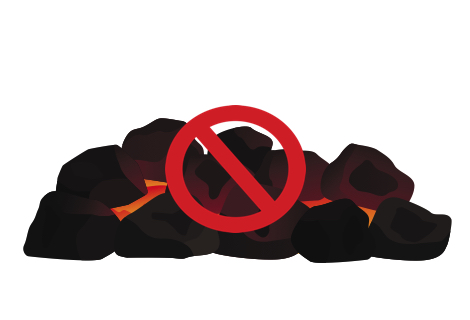Coal Banned in Household Wood Burners in 2021
Earlier this year it was officially announced burning coal in UK homes will be banned in 2021. Although the decision was 18 months in the making, it should come as little surprise to anyone that the government is intending to ban fuels that contribute significantly to the UK’s air pollution.
If you have a multi-fuel stove and still burn coal for heat, it may be time to consider switching to an alternative fuel source. Similarly, garden centres, DIY stores, petrol stations and a slew of other retailers will be banned from selling not only coal but wet wood – another air pollution culprit.
The UK Government’s Perspective
Plans to phase out coal and wet wood burners were first proposed almost two years ago, with the UK government stating that the public should move towards cleaner energy alternatives. In February 2020, the Department for Environment, Food and Rural Affairs confirmed that coal fires and wet wood burning will be banned in 2021.
The government has stated that coal burning stoves and fires are the largest source of fine particulate matter (PM2.5). These particles cause cardiovascular and respiratory diseases, even cancer. In 2016 alone, air pollution was responsible for 4.2 million deaths worldwide.
Any opportunity to reduce the number of deaths from particulate matter must be taken which is why the government is focused on reducing pollution caused by industrial, domestic and traffic sources. Coal burning stoves fall into the domestic category.
Air Pollution and Our Health Explored
Sadiq Kahn, the Major of London, has spoken publicly about the threat of air pollution and how its impact, though naked to the human eye, constitutes a ‘public health emergency.’ He goes on to say that just because we cannot see nitrogen dioxide it doesn’t mean that it isn’t there.
Research over the last few decades has revealed how gases like nitrogen dioxide and tiny particulate matter, like which is released when burning coal, can cause lasting damage. The most obvious effects being on our breathing.
Anyone suffering from asthma, or any other respiratory illness, is more at risk than others because the dirty air can cause chronic health problems, even triggering an asthma attack. More pertinent, given the current number of Covid-19 cases, any additional measures to protect our respiratory system should be taken. Banning coal burning is one such measure.
Is This the End for Cosy Fires?
Absolutely not. In fact, quite the opposite. Banning burning coal and wet wood only means that people won’t be able to burn those fuels. You’ll still be able to buy dry wood to burn – in fact, now’s a better time than ever before to stock up on oak, ash, beech or olive wood!
The sale of bagged house coal will be phased out, hopefully, by February 2021 and any sales of loose coal direct to customers will be phased out by 2023. Sales of wet wood in small units (less than 2m cubed) will also be phased out by 2021. However bulk purchases of wet wood will still be sold, along with advice on appropriate drying. In the future, any manufacturers of solid fuels must demonstrate that they have a very low sulphur content and emit only a small amount of smoke.
So, curling up with your significant other by a roaring fire with a nice mug of hot chocolate won’t become a memory! You’ll still be able to enjoy nights by the fire – only they’ll be much safer for you and better for the environment.
Haven’t We Seen Something Like This Before?
If the government’s decision to ban people burning coal in wood burners may seem familiar to some, it’s because the decision echoes a controversy that’s dominated the motoring industry headlines for the last few years – dieselgate.
Leading car manufacturers, including Volkswagen and Mercedes have been found guilty of cheating emissions tests by fitting vehicles with ‘defeat devices’ which lower Nox levels, allowing vehicles to meet emissions regulations. Volkswagen, Mercedes and other manufacturers marketed these vehicles as eco-friendly.
The scandal has since been brought to light and millions of vehicle owners in the UK, Europe and the US are now pursuing group litigation claims against Volkswagen, Mercedes and Skoda to name just three manufacturers.
Likewise, many people bought wood burning stoves because they were led to believe that they didn’t have a negative effect on climate change. This has proved to be wrong and now local authorities are enforcing clean air rules which ban homes from having chimneys billowing smoke.
It’s obvious that we’re all becoming more concerned with the environment and less patient with big businesses who flout the law for profit – something that local and national governments the world over are focused on too.
What this all means is that it’s imperative for anyone with a wood burner to make sure that they don’t burn coal and that if they are burning wood, it’s thoroughly dried. The environmental, health and legal ramifications of burning coal or wet wood are just too serious to take the risk.
A Cleaner Future
The UK’s 2019 Clean Air Strategy has laid out its commitment to reducing PM2.5 emissions, alongside four other air pollutants, including ammonia and nitrogen oxides. The government hopes that a staggered phasing out of coal and wet wood will give retailers the chance to sell any excess stock and switch to dry wood.
It’s hoped that by 2030, the UK will have reduced PM2.5 emissions by 46% and that the risk of air pollution damaging our health will be greatly reduced.
In short, it’s never been a better time to stock up on dried wood and Firewood for Stoves has an excellent collection from which you choose from. Browse our excellent stock online. If you have any questions, call us today on 0333 300 1299.





Leave a Reply
Want to join the discussion?Feel free to contribute!